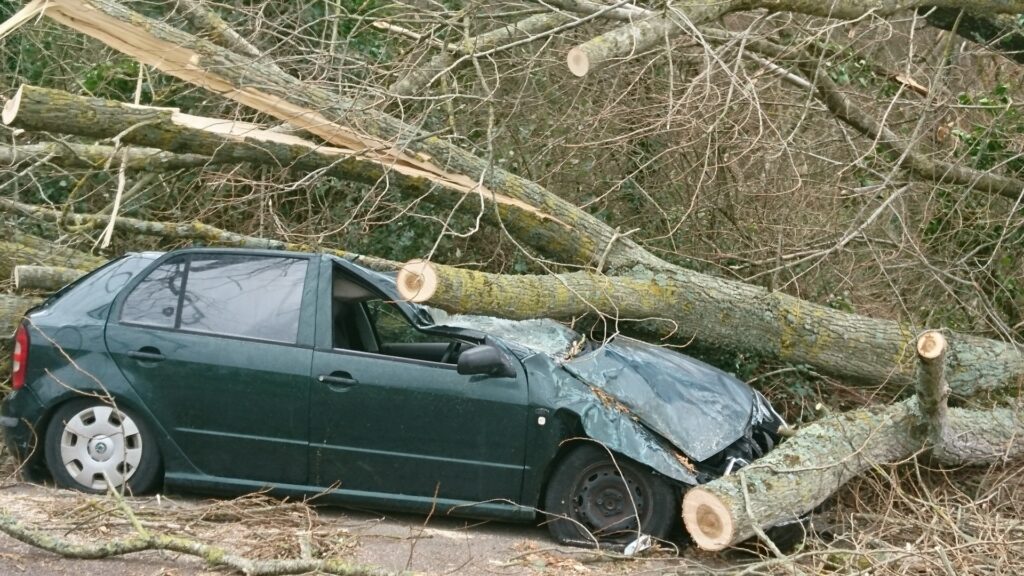In the past two years, the world has been rocked by three huge events: covid, the rapid acceleration of the climate crisis, and now by Ukraine. Most of us did not see any of this coming: a few people did, and the ones I know are telling us to brace for more major shocks ahead.
None of us relish the prospect of disruptions and uncertainty continuing to grow, but let’s face it, that’s far more probable than any ‘return to normal’. Somehow the Ukraine crisis has pushed me into accepting that normality is over: the decades where many basics in life were stable, where we believed crises could be resolved, and progress would continue.

Storm Eunice impact at the end of my road
My hope in this blog is to share some approaches which may help you to navigate in this new, turbulent, norm-less reality we’re all having to adjust to. Many of these ideas arise from recent conversations, which had a depth of insights and honesty that feels new, and seems to be one of the gifts our situation offers us.
- Interrogate the situation: what I mean by this is, be persistent, creative, and patient in trying to discern some meaning in these circumstances which just look intolerable and overwhelming. Can you find an insight, a way to evolve a response, for yourself, your community, for society at large? I’ve shared what I’ve found below, but I urge you to do your own looking.
- Aim to live in dual consciousness: the awfulness of these crises is real. I share the view of various teachers that we need to keep these painful feelings in our awareness, feel the discomfort, to give us the momentum to learn from them and grow through them. However, I realised a few weeks ago that when this is my only, dominant, reality, I sink into depression, and I can’t act constructively. Now, what I try to do is carry a second reality alongside this, described in the next paragraph.
- Savour deeply everything that’s still good in your life: this is a bit akin to mindfulness, and to the contemplative approach of some Christians, such as Richard Rohr, but it feels more than that. Carrying a present awareness of so much awfulness has pushed me to a much more immediate and detailed sense of gratitude for even basic aspects of life, like my clothes, the air I breathe, the clean water I drink. I’m trying to do this many times a day, and on a good day I feel calmer and somehow expanded.
- Seek meaning on different dimensions: you may recall Einstein’s famous comment that “we cannot solve our problems with the same thinking that created them”. One reason I talk a lot about meaning in this blog is that many experts believe a crucial factor in raising our resilience is finding meaning in our situation. This is the aim of the interrogation mentioned above. Here are some of the potential insights from my recent conversations and pondering:
- Humans mostly see life as having just four dimensions (space plus time). Imagine there may be 10 or 20 dimensions, and the meaning of our current crises is on levels very hard for us to access or understand.
- Responses to the climate crisis and other big challenges are limited by many systemic features of our society: social media manipulating us, fake news, vested interests in businesses… Maybe the only way to force the radical, positive transformation needed is through a series of huge crises.
- If more of us accept that the old normal is gone, maybe we can meet this new, uncertain reality with positive qualities like compassion and co-operation. See more in this blog from Jem Bendell of Deep Adaptation.
- Try exploring your current situation and feelings from the viewpoint of your soul. Imagine your soul chose to be with you here in these crises, and ask it, ‘What am I here for?’ See more at my new website: www.soulresilience.net.
- To set your priorities, look further ahead: this takes courage and skill, when the future looks worrisome and uncertain. I’m suggesting that you try to feel into what life may be like 10 years ahead: don’t try to forecast details, but seek a flavour, and see how it guides you. I tried this recently when talking to a friend, and found myself saying that in 10 years’ time, features of life that we associate with ‘developing’ countries would be commonplace in the UK, Europe, US and beyond: such as food shortages, fuel shortages, power cuts, disruptions to public services. Which led me to feel that my priority should be to help my home community and others to develop the skills to handle all this without society collapsing. By skills, I mean the ability to express and hear strong feelings appropriately, to collaborate with others under pressure, and more. A sample programme for this is Future Conversations, which I helped to develop.
- Double the rations: we need to recognise that the ongoing context we are all living in is abrasive and exhausting. Whatever in your life nourishes you and lifts your heart, double the supply!
- Reach out: all this is hard to handle alone – it helps us a lot to talk about it with friends, family, or a supportive group.
- Try prayer: we are facing huge crises where it’s impossible to see a solution on a rational, material level. Maybe there is meaning and positive outcome to be found in a superhuman or divine dimension. So why not respect this possibility by praying for a positive outcome in Ukraine, in the climate crisis, and more?
